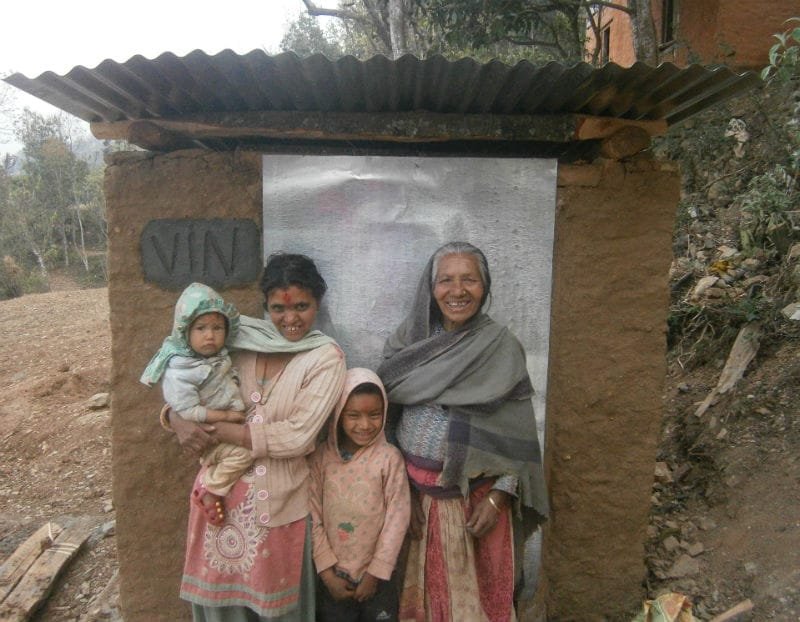Volunteers Initiative Nepal (VIN) has supported 958 earthquake victim families from Nuwakot, Kathmandu and Okhaldhunga through WASH project (water sanitation and hygiene) project. Altogether 958 families have permanent toilets and received education on WASH.
VIN has been implementing WASH project in Kathmandu and Okhaldhunga since 2007. It has implemented WASH for disaster relief project in Kathmandu, Nuwakot and Okhaldhunga in 2015/16. The main objectives of the project were to create awareness on water, health hygiene and sanitation and increase their access to hygiene and sanitation facilities. Major activities of the project were education, behavior change campaigns on WASH and partnership to build toilets.
The key concepts of VIN’s WASH project were:
Combine education with the provision of facilities
Form coordination and users committee and utilize social groups created as part of VIN’s other programs or existed in communities, especially Women’s Groups, children’s clubs and youth clubs
Encourage community participation and adopt a cost-sharing approach
In first part, VIN has facilitated to organize campaigns and training on general health, hygiene, safe drinking water and sanitation concepts and practices. It was focus on behavior change communication which would help to transform deep rooted beliefs and practices about hygiene and sanitation among target groups. The programs were conducted by mobilizing youth groups, women groups (Ama Samuha), local female health volunteers and child clubs. The programs was targeted to women and children from communities and students, teachers and parents from schools.
The content of the campaigns were-
Importance of health hygiene and sanitation,
Importance of hand washing, techniques and timing,
Toilet using and its’ importance
Water purification techniques
Toilet construction project of VIN, role and responsibilities of families, and about using sanitary products.
In second part, VIN supported to build a toilet. VIN provided technical assistance and shared cost of construction with the local community. Specifically, it was funded and provided certain construction materials that were harder to source, while the community has provided the physical labor and construction materials that was available locally. We bought pan, syphon, cement, iron rod, HDP (connection pipe), LDP (gas pipe), CGI sheet and binding wire. It took 5 days to complete a toilet, where family and skilled manpower made everything ready prior to the material delivery.
It is concluded that VIN has successfully implemented WASH project in Jitpurphedi, Okharpauwa and Okhaldhunga. The project has supported to build 958 toilets. Families from 958 houses are trained on hygiene and sanitation practices. VIN has facilitated to form a WASH committees, VDC level coordination committee (VWASCC) and ward level water and sanitation users committee (WSUC) in all project sites. It has enriched the capacity of local WASH committee to follow up and monitor the project. The project is success to bring out the change in people behavior about WASH. They have been using toilet and washing hands with soap and water. It has increased people access to hygiene and sanitation facilities. The project has contributed to achieve an Open Defecation status of the communities. Furthermore it has contributed to the sanitation goal of the country to achieve total sanitation status by the end of 2017.
The WASH project implemented by VIN is appeared to be largely effective in the community which is also proved by the views expressed by beneficiaries-“I learnt about hygiene and sanitation, hand washing and water purification technique from the training conducted by VIN. We build a toilet by the materials supply by them. We used to go to field and forest for toilet in the past. It was risk with snake, animals and rain. Now we are safe from this. This kind of project is very good. I wish all households in the village have toilets. I like to thanks to VIN and donor for this kind support.” Manjushree Lama, female health volunteers, Okharpauwa.
“The WASH campaign organized by VIN was useful. I learnt about hygiene and sanitation, hand washing and water purification technique from that campaign. We built a toilet with the materials supply by VIN and local materials available in our house. We couldn’t make it if it was not supported. We used to go to field and down the hill for toilet in the past. It was risk with snake, animals and rain. We had a fear of other people. Now we have no worries about it. We have a toilet close to house. We can use it at night also. I like to thanks to VIN and donor for this support.” Saraswoti Lama, Jitpurphedi
Next VIN has a plan to support 3000+ earthquake victims through WASH project in near future. If you are interested to be a part of the project and apply now.


 Member of
Member of